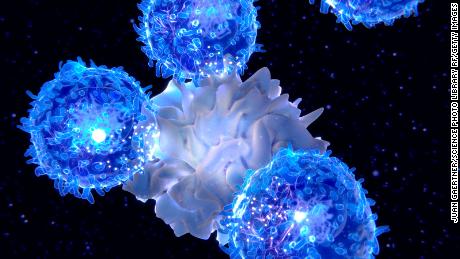(CNN)Social stresses such as discrimination, family problems, work and money problems contribute to the premature aging of the immune system. It may be. Recent studies have been found. It is a double pain because the immune system already deteriorates with age.
"People with high stress scores have an older immune profile, a lower percentage of fighters with fresh illness, and a higher percentage of T cell depletion," Cropack said.
In addition to finding that those who reported higher stress levels were predominantly zombie cells, Cropack and his team were the young, fresh cells needed to take on new invaders. We also discovered that there are few "naive" T cells.
"This paper adds the finding that psychological stress on the one hand and happiness and resources are associated with immunological aging on the other," said a clinical psychologist who was not involved in the study. Suzanne Seegelstrom said. ..
Segerstrom, a professor of developmental psychology, social psychology, and health psychology at the University of Kentucky at Lexington, studied the relationship between self-regulation, stress, and immune function.
"In one of our new studies, older people with more psychological resources had" younger "T cells," Segerstrom said.
Poor health behavior
Survey subjects were asked about the level of social stress, such as "stressful life events, chronic stress, daily discrimination, and lifelong discrimination." They then compared their response to the levels of T cells found on blood tests.
"This is the first time a large national survey has collected detailed information about immune cells," said Cropack. "We found that older people with a lower percentage of naive cells and a higher percentage of older T cells had an older immune system."


T cells are activated by dendritic cells and elicit an immune response.
In this study, the association between stressful life events and naive T cell depletion was education, smoking, drinking, weight, race or It turns out that it remains strong even after controlling the nation. Cropack said.
However, taking into account poor diet and lack of exercise, some of the relationship between social stress levels and the aging immune system has disappeared.
This finding shows how much the immune system ages when we are stressed is under our control, Cropack said.
Effects of stress on the brain
When stress hormones flood the body, the neural circuits of the brain change, affecting our ability to think and make decisions. Experts say it gives. Anxiety may increase and you may change your mood. All of these neurological changes affect the entire body, including the autonomic nervous system, metabolic system, and immune system.
A breakthrough discovery in 1968, McCueen discovered that the hippocampus of the brain could be altered by stress hormones such as cortisol, and neuroendocrinology at Rockefeller University in New York City. Died in 2020 after studying for 54 years.
"I'm stressed" and I'm less involved in regular physical activity, such as neglecting to meet friends, taking a break from work, sitting in front of a computer and trying. It may happen. To get rid of the burden of having too much work to do, "McKuen wrote.


